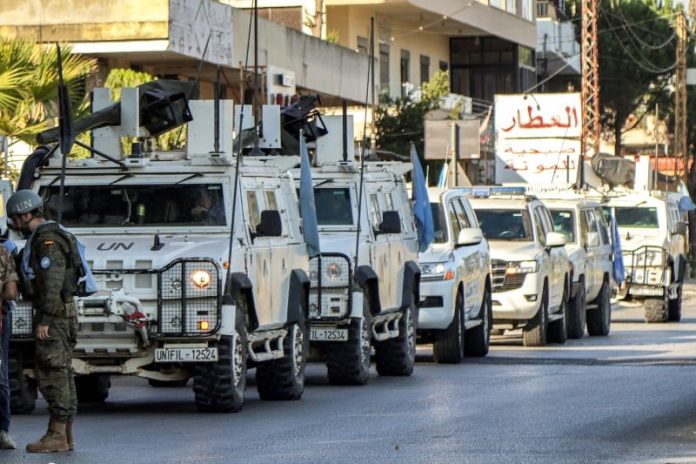Israeli Prime Minister Benjamin Netanyahu appealed to UN chief António Guterres to evacuate UNIFIL peacekeeping troops from combat zones in Lebanon as the situation in the country worsens.
The appeal came a day after the United Nations Interim Force in Lebanon (UNIFIL) refused to withdraw from the border zone despite five of its members being wounded by Israeli fire in recent days. According to Netanyahu, the Israeli military repeatedly asked the UN to evacuate the soldiers, adding that their presence in the area made them hostages of Hezbollah, as Israeli troops shelled the UN headquarters in the south earlier this week, wounding two peacekeepers for the second time in days.
Mr Secretary General, get the UNIFIL forces out of harm’s way. It should be done right now, immediately. Your refusal to evacuate the UNIFIL soldiers makes them hostages of Hezbollah. This endangers both them and the lives of our soldiers (…) We regret the injuring of UNIFIL soldiers and we are doing everything in our power to prevent this injuring. But the simple and obvious way to ensure this is simply to get them out of the danger zone, according to Netanyahu in a video message.
UNIFIL spokesman Andrea Tenenti, for his part, told AFP on Saturday that “there was a unanimous decision to stay because it’s important for the UN flag to still fly high in this region, and to be able to report to the Security Council.” He said that Israel asked UNIFIL to withdraw from positions up to five kilometres from the Blue Line separating the two countries, but the peacekeepers refused.
UNIFIL, a mission of some 9,500 troops of different nationalities established in 1978, is tasked with overseeing the ceasefire that ended the 33-day war in 2006 between Israel and Hezbollah. Forty countries that contribute to the peacekeeping force in Lebanon said Saturday they condemned recent attacks on peacekeepers.
Risks of hunger and malnutrition in Lebanon
The UN World Food Programme reported that levels of acute hunger could rise very quickly as food security in Lebanon was already precarious before Israel began full-scale aerial bombardment in mid-September, as intensified fighting with Hezbollah since 7 October has already displaced 40 per cent of local farmers, disrupting local production and interrupting trade flows and access to markets. Hunger and malnutrition levels in Lebanon could rise exponentially if Israel follows through on threats to escalate the current military operation, which has so far killed more than 2,000 people and displaced nearly a million, UN said.
“Israel has the ability to starve Lebanon – like it has starved Palestinians in Gaza. If you look at the geography of Lebanon, Israel has the power to absolutely put a stranglehold on the food system. There is a huge risk of hunger and malnutrition rates skyrocketing very quickly in Lebanon,” according to Michael Fakhri, the UN rapporteur on the right to food.
Access to sufficient food has become increasingly difficult as entire communities have been displaced from their homes and farmland in southern Lebanon and civilian neighbourhoods in Beirut have been subjected to massive airstrikes. Apart from that, some 10,500 have suffered injuries since Israel launched its attacks on the country a few weeks ago, health ministry reported on Saturday, adding that 2,255 people have been killed in Israeli attacks. The rising death toll also comes amid Israel’s forced displacement of 1.2 million people in Lebanon, about a quarter of the country’s population.
